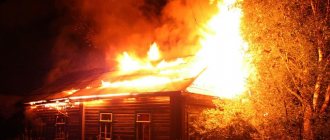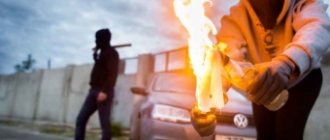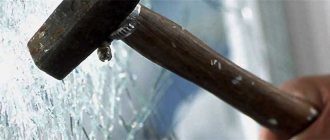Damage to someone else's property is the destruction or damage of someone else's private property to such an extent that it can no longer perform its functional duties. Someone else's private property means any thing that does not belong to the person who damaged or destroyed it.
Articles 167 and 168 of the Criminal Code of the Russian Federation on damage to someone else's property contain information about criminal liability for damage to someone else's property through negligence and intentional destruction of someone else's property.
Liability for intentional damage to someone else's property
Criminal or administrative punishment is provided for a crime committed intentionally (on purpose). If the criminal had the direct intent to damage property worth more than 5 thousand rubles, the victim can file a claim based on the fact of the crime.
Evidence of the defendant's intent usually comes from crime scene videos or the testimony of unrelated witnesses. But the court may also consider other indirect evidence.
If the fact of intentionality of the crime is confirmed, according to Article 167 of the Criminal Code of the Russian Federation, the defendant faces one of the following penalties:
Vandalism
In the event that public property has been destroyed or damaged (broken, broken, covered in obscene words and graffiti, etc.), then we are talking about an act of vandalism. Public property includes buildings and structures, public transport, stops, property located in parks and recreation areas (benches, lanterns, trash cans). Responsibility for vandalism is provided for in Article 214 of the Criminal Code of the Russian Federation.
- an administrative fine of up to 40 thousand rubles or wages for a period of up to 3 months;
- correctional work;
- compulsory work;
- imprisonment for up to 2 years (in case of a particularly large amount of damage).
But punishment will follow only if the value of the damaged property was more than 5 thousand rubles and such damage was significant for the victim. The court determines the significance of the damage privately based on the level of income of the victim in comparison with the damage, the presence of dependents in the care of the victim and the presence of other aggravating circumstances.
The degree of liability of the defendant is also aggravated if, as a result of the destruction of the thing, physical harm was caused to the defendant or a third party (several persons).
Watch the following video about the intentional destruction or damage of someone else's property
What should the victim do?
The owner of the damaged goods must take the following actions:
- Assess the amount of damage.
- Write a statement to the police. The document indicates: the addressee in the format: exact name of the department;
- Full name and title of the boss;
- Full name;
- suspects;
Hint: if the police did not involve an expert to assess the damage, then the victim pays for his services.
The amount should be included in the amount of damage. Video on property damage
Similar articles
- Property crimes
- Responsibility for beatings
- Compulsion to testify
- Crimes against constitutional rights and freedoms
Liability for unintentional damage to someone else's property
Damage to property that was carried out without direct intent (accidentally) and the intentionality of which could not be proven is considered unintentional. A person who accidentally damages someone else’s property may be held criminally liable when the amount of damage to the plaintiff is more than 250 thousand rubles, and the property is damaged due to arson or explosion.
In this case, the defendant will be awarded one of the following penalties:
- A fine of up to 120 thousand rubles.
- Imprisonment for up to 1 year.
In the article https://lexconsult.online/6689-posledstviya-umyshlennogo-neumyshlennogo-podzhoga-po-uk-rf find out how much they give for intentional arson.
Civil liability
Criminal liability for violation of the law by damaging someone else’s property occurs in the above cases, but the culprit is obliged to compensate the injured party for losses according to the Code of Administrative Offenses in any case. If it is not possible to voluntarily agree on compensation for the cost of damaged or destroyed items, the victim may file a claim in civil court. If the defendant's guilt is proven, the court will force him to compensate for the damage in full. Read here about compensation for property damage in criminal proceedings.
It is worth noting: the person guilty of damaging someone else’s property may not bear criminal liability in the event of reconciliation with the victim (Article 76 of the Criminal Code of the Russian Federation). The initiator of signing a settlement agreement can be any of the parties to the conflict. In this case, the offender must make amends for the harm caused to the victim. You can read more information about the reconciliation of parties in criminal proceedings.
But you should know that if the amount of damage for an intentional crime is less than 5 thousand, and for an unintentional crime - less than 120 thousand rubles, there is a limitation period of 3 months. If the victim does not go to court within the specified period, he will not be able to recover compensation from the accused.
The amount of damage can be assessed in several ways depending on the individual situation. These methods include:
- Independent examination. It is usually used in case of damage to cars, real estate and expensive equipment.
- Providing a receipt for the purchase of the item. It is used for damage to fur products and other things whose value has not changed since the date of purchase.
- Determination of average market value. It is used in cases where a car, real estate, equipment or other thing, the receipt for which has not been preserved, is completely destroyed. Then the expert takes into account the year of manufacture and technical (and other) characteristics of the property and determines the average market value of such an item.
Based on the cost and quality of property damage, the amount of compensation to the victim is determined.
Find out what to do if your property is destroyed or damaged in the video below.
What is property damage?
In the legal field, property means material wealth resulting from the application of labor. The owners are sensitive to the property. It has considerable value, including being a source of pride and confidence in the future.
Attention: from a legal point of view, damage is a deliberate attack on someone else's property. That is, an attempt to violate the owner’s right granted to the latter within the framework of the law.
In criminal law, property is considered exclusively as a material object:
- it is endowed with a very definite value;
- according to legal norms has a specific owner;
- the latter’s right to freely dispose of goods is protected within the framework of the law.
Hint: intentionally causing harm to common joint property does not constitute a criminal offense. Such an act is subject to punishment under the Code of Administrative Offenses (CAO) of the Russian Federation.
Definition of the act of damaging property
A description of crimes aimed at someone else's property is given in two articles of the Criminal Code: 167 and 168. Their text characterizes socially dangerous actions, as a result of which damage is caused to the owners.
Property means any property, the right of ownership of which is defined in the legislative field. These can be objects, movable things, real estate.
Definition: damage in the legal field means causing harm to objects that:
- does not allow it to be used to its full extent;
- completely destroys.
An object
The objects of the criminal offense under study include relations in the field of property ownership. The division of responsibility within the framework of the two specified codes is associated with the characteristics of the damage and other features of the offense. Under the articles of the Criminal Code, intentional damage of a large scale is prosecuted. Other consequences are subject to punishment under the Code of Administrative Offences. Hint: the destruction of objects and things by the owner is not subject to punishment if such an act did not cause damage to other persons.
Subject of the criminal act
In the legal field, the subject of encroachment is any object, the ownership of which has been established. The investigation begins at the owner's request. The objects of crime include the following types of property:
- private;
- state;
- general joint.
Documents and things of particular value are included in a separate group of criminal offenses (Article 243 of the Criminal Code). In this case we are talking about items for which importance has been established:
- cultural;
- historical;
- religious;
- state
Attention: aggravating circumstances in the paragraphs of the Criminal Code include the following:
- hooligan urges;
- implementation methods:
- arson;
- explosion;
- others (using mechanisms, for example).
On the role of the magnitude of damage
During the investigation of the offense, the amount of loss caused to the owner is determined. Establishing a specific value is crucial in determining the punishment of the perpetrator:
- significant leads to the application of the rules of the Criminal Code;
- the rest falls under the rules written in the Code of Administrative Offences.
The proceedings in court are carried out on the basis of the documents provided. This also affects the calculation of the amount of damage. For example, if a person set fire to his house, and the fire spread to a neighboring building, then the cost of the arsonist’s goods is not taken into account.
Hint: the significance of the damage is deciphered in Article 158 of the Criminal Code. According to its text, damage is calculated taking into account the financial situation of the victim. The amount cannot be less than five thousand rubles.
Explanation of terms
Three terms will be used to describe damage to property. Each has a strictly defined meaning, which is important when investigating circumstances. The decryptions are as follows:
- Damage is minor harm. Items are subject to repair or restoration of functionality.
- Destruction - rendering an object completely incapacitated. It cannot be used or repaired.
- The concept of “damage” combines both into one group.
Hint: the judicial determination uses an accurate description of the harm caused.
Arbitrage practice
In the event of an unintentional arson of property, the guilty party is forced not only to compensate the victim for losses, but also, in some cases, to pay a fine.
For example, if the culprit unintentionally caused damage to an expensive car worth more than 250 thousand rubles, he will additionally be required to pay a fine of up to 120 thousand rubles to the state or serve another penalty other than compensation for damage to the victim.
In the event of intentional damage to someone else’s property in an amount exceeding 5 thousand rubles, the severity of the damage caused to the victim is also assessed. For example, having destroyed an item worth 6 thousand rubles, the owner of which has an income of about 8 thousand rubles a month, the defendant will be required to pay, in addition to compensation for the cost of the item, a fine or be sentenced to other criminal penalties. If the owner of a destroyed item worth 6,000 rubles has an income of over 100 thousand rubles per month, no criminal punishment will follow.
Still have questions about the degree of guilt in damaging someone else's property? Ask them in the comments
School is a place where children receive not only knowledge, but also a variety of life experiences, spending most of the day outside of parental care. Their safety is a matter of concern and responsibility for parents, teachers and school administration. Zelenograd.ru tried to raise a small part of the issues related to school safety and discuss with an expert the rules of conduct at school in several specific situations: damage to school property, theft and damage to other people’s property at school, tardiness and violation of school access rules, bad behavior of children in lessons and during breaks, as well as the problem of smoking among schoolchildren.
In the studio is Svetlana Viktorovna Timakova, a specialist from the district education department, who spoke about who and how monitors compliance with standards of behavior within school walls.
| Listen (31:33) | download sound file (22184 kb) |
- Svetlana Viktorovna, let's talk first of all about how school safety is regulated today - what are the rules, documents, regulations?
— Today I would like to talk about the prevention that is carried out at school regarding all offenses that may exist. And, first of all, I want to say that we are all educated people, we know our rights, but, unfortunately, we very often forget our responsibilities. And without knowing our responsibilities, we begin to infringe on the rights of other people. Of course, when parents come to an educational institution, choosing it according to one or another principle, they are guided by the fact that the child will be comfortable, safe and study well at this school. But when submitting an application to enroll a child, you must still very carefully read the charter of the educational institution. Sometimes parents write in the application “I have read the charter,” but do not look at it themselves, but this is one of the main local acts of any educational institution. The charter contains the main points of the federal law on education, which we are all obliged to comply with. The charter contains information about what rights students and parents have, and what an educational institution is obliged to do. Therefore, the charter must be studied by every parent, and it is advisable to have it at home.
— Do I understand correctly that the charter contains both specific rules for a given school and federal and regional components common to all?
— Naturally, because each school has its own internal daily routine, its own rules of behavior for students. And if you want to know your child’s rights, you should definitely look at these documents.
— Not a single parent can say “I’m not familiar with the charter,” because when a child enters school, he is obliged to sign and, perhaps, receive the charter in his hands?
— The school is obliged to familiarize each parent with its charter, and, naturally, the parent, if possible, should study this charter. Since our information space is now quite open, the charters of many schools are on school websites. You can go to the website, see the schedule, teachers, get acquainted with the charter, the rules of school life, and the requirements that the school places on students and parents. Parents should take more active advantage of this opportunity.
— So, if one of our listeners is now thinking, “I don’t know the charter of the school where my child is studying,” he should go and study it, and we even have the right to advise him to do so?
- Yes, he has the right to do this as the legal representative of a minor.
Damage to school property: parents will fix it
— Let's talk about specific examples of violations...
— In our educational institutions, of course, there are conflict situations. Sometimes conflicts arise regarding damage to school property. This is a sore point, and I’ll explain why. The fact is that the bulk of our educational institutions are public, we have only a few private schools. And in public schools, the state spends budget money on the formation of the material and technical base of the institution. And believe me, every director and teacher wants all the classrooms and their equipment to be in order. And when children accidentally or maliciously begin to damage property... you understand, it doesn’t appear out of thin air.
- Fine. For example, my child scribbled a word on his desk, the name of his beloved girl. The teacher caught him doing this. What happens next?
— This is a state educational institution, the state financed this desk. An analogy: if you damage a seat on the subway, for example, by cutting it up, this will be classified as petty hooliganism. That is, the administrative code will come into its own.
“And school isn’t some kind of special world?” Do the same rules and laws apply here?
— Absolutely the same laws that apply on the territory of the Russian Federation.
“But if a child violates them, then his parents will be responsible for him.”
- Absolutely right. Because in our country, a child’s responsibility begins under a number of articles of the criminal code from the age of 14, and under a number of articles of the administrative code from the age of 16. In general, until the age of 18, a child is a “child”, and parents are responsible for him.
“Returning to this example,” the teacher caught the child, “what happens next?” Surely the teacher must somehow record this violation? Let the matter proceed through the principal, class teacher, and then bring parents to this responsibility, including financial responsibility?
— Here everything happens the same way as in the bulk of government institutions. The class teacher or teacher is obliged to reflect in the report addressed to the director the committed fact of damage to property. A commission created by the administration verifies how true this is. Parents, as legal representatives, are naturally informed. As a rule, the administration and parents agree among themselves without applying legislative norms.
— So, there is a practice of resolving such cases within the school? Does the parent somehow compensate for the damage or does he come and wipe off the inscription on the desk?
- Depending on how badly the property is damaged. But, as a rule, it does not come to court. We come to an agreement with each other and find forms of interaction.
- This is for minor damage to property. Does anything so terrible happen in practice, when the amount is such that you have to go to court - for example, a child broke all the windows at school?
— In my experience, I don’t remember such a situation when the school administration sued legal representatives. We have never had this in practice before.
Theft and damage to other people's property: “The school has enough resources to find the culprit without resorting to lawsuits”
— What if a child somehow damaged the property of another student - for example, tore his jacket?
— All the frameworks of our administrative and criminal legislation apply here as well. The legal representatives of the victim may contact the legal representatives of the person who caused the damage, in person or in court.
— For example, a child comes to the locker room after school and sees that his things are damaged, for example, his clothes are cut. He doesn’t see the culprit - what should he do in this situation when the culprit is not obvious?
- Naturally, contact the class teacher, the administration. Yes, we have such situations, this is life, and there is no escape from it. Again, we do not get to the point of prosecuting lawsuits with the involvement of the police. We are trying to find the culprit within the team and use every opportunity to do so. The school has enough resources to investigate the situation and find the culprit without taking the situation to court action. Otherwise, all we will do is go to court and not study.
— The school and its administration are conducting the investigation themselves?
— The school has security, teachers on duty, and administrators on duty. It is extremely rare that a situation goes unnoticed.
- Did anyone see who entered the locker room - are they starting to question the children somehow?
- It’s absolutely right to ask “who did you see?” It happens that children lose sums of money and phones, which they forgetfully leave behind, although there are notices everywhere that say “Do not leave valuables.” You should try to carry everything with you.
— To what extent does the school “do not want to wash dirty linen in public” and try to hush up some unpleasant incidents when it is not obvious who is to blame? It happens?
— Hushing up is, of course, not our option for the reason that, as you understand, for any educational institution its reputation is extremely important. And if somewhere somewhere we have something out of the norm, it means that our administration did not complete the work, the teachers on duty did not inspect and did not track. They did not raise the children well, did not explain to them that other people’s things are property that must be respected, no matter what it is. In this case, we are obliged to set ourselves the task of improving the methods of education, including legal education, in the educational process.
— By the way, is prevention somehow regulated before and any conversations after problematic situations occur? For example, if a theft occurs at school, it doesn’t matter whether the culprit was found or not, is it the responsibility of the class teacher, for example, to have a conversation with his class: “Guys! This incident happened at our school... Please, I draw your attention once again, watch your things, don’t leave money in your outerwear in the locker rooms”?
“I immediately want to divide all thefts into those that fall under the administrative code and those that fall under the criminal code. And we conduct conversations - without announcing names, as if it were a case in general. We have a responsibility to tell children which pieces of legislation need to be looked at again. After all, our children are our future citizens, and they are obliged to know the legislation of their country. Naturally, the competence of class teachers, educational psychologists, social educators and administration includes the legal education of students.
“So, whenever something happens at school, the children are constantly reminded of these rules.”
“We start with the rules and regulations of behavior, and, as a rule, we end at the end of the year with the same thing: “Dear children, remember that you are not alone. You must respect the rights and freedoms of others, but also defend your point of view.”
— Is it somehow discussed with parents so that they, for their part in the family, conduct preventive conversations with children, remind them of the rules of life in society and in the team?
— Without fail, because parents are participants in the educational process, along with teachers and children. Many schools are beginning to use forums and hotlines in their practice, where parents can ask questions that interest them in real time. No one has canceled parent meetings, where we invite specialists from different departments to speak again for parents. Unfortunately, I must admit that, as a rule, many parents are very reluctant to listen to specialists, juvenile affairs inspectors and the administration, who begin to say: “Dear parents, pay attention to such and such moments.”
— Is the hotline for parents in Zelenograd operational or is it planned to be created? It would be very cool if a parent always had a hotline number on their mobile phone and called if something happened.
— The district education department plans to create a hotline at its level, there is such a project. I repeat once again that many schools already have such opportunities on their websites - we are beginning to use them more and more widely.
“Late and no shift”
— If we talk about security, what rights and responsibilities exist regarding access to school? Often children are not allowed in without a change of shoes and are not allowed out of school during lessons. I know that sometimes the school closes the toilets during classes. Is it possible to kick a child out of class for bad behavior or not? Tell us about these situations.
- Let's go in order. Let's start with the fact that, as you know, we have centralized security in all schools. This is a prerequisite for our educational process. Naturally, if the rules of conduct for students stipulate that they should come to school in a change of shoes and neat clothes, these rules must be followed. If the street is dirty, then the cleaner cannot always clean up after every child who comes in without a change of shoes. And this should be realized by parents that children are required to come with a change of shoes and on time. If a child is late, he disrupts the learning mood and disrupts the lesson: the children are distracted, and the teacher may lose the main information part of the lesson due to the fact that Masha or Vasya were late. After all, we ourselves, as adults, do not allow regular lateness to work - and we must develop such discipline in our children from elementary school. Time is time, you have to arrive at the time.
— If, after all, a child is late, comes without a change of shoes and is not allowed to go to school, where should he go?
“They can’t not let him go to school, because he has already arrived, and the school has already begun to bear responsibility for him. If it is possible for someone to bring replacement shoes or give a child shoe covers - as in an elementary school, where replacement shoes are a mandatory condition of sanitary standards - then the situation, of course, will be resolved. To not be allowed into school and sent somewhere is an extraordinary case, and then the administration takes responsibility for what may happen to the child during this time.
“So parents shouldn’t worry that their child won’t be allowed to go to school for some reason?” As a last resort, he will sit and wait for the start of the second lesson if he is late for the first?
- If he was late for almost the entire lesson and came to the end, then, naturally, there is no point in letting him in, and if he was 10-15 minutes late, then, of course, he will be sent to class.
— With corresponding entries in the diary about behavior?
— With the entry “Dear parents, please note that the child’s morning discipline is suffering.”
Bad behavior in class: a psychologist, teacher on duty or school police inspector will calm you down
— If a child misbehaves in class, can he be expelled from the class? And who is responsible for it in this case?
— Decipher the term “misbehaves in class.” I don't really understand.
“For example, he starts hitting his desk neighbor on the head with a textbook...
- Here, excuse me, the criminal code comes into force.
-... loudly calling names...
- If this is a censored form, then that’s one thing, if it’s obscene, then...
- ...shoots paper from a tube, pulls a neighbor’s pigtail...
— You give examples that, to one degree or another, harm another child.
- What should happen in such cases? I just remember my school childhood...
— We, as a rule, have an exempt administrator in an educational institution. And if the situation is really “awful”, then you can turn to his help - so that he takes the child out for at least a few minutes, the child calms down, comes to his senses in the presence of an adult and goes to continue his lessons. Everything that you have just listed is, as a rule, not just a violation of discipline, it is extreme forms of manifestation of negative behavior. But in general, of course, if a child is quite weak, he is not interested in learning due to lack of motivation, or due to his abilities he does not master the program very well, then our teachers try to give him slightly modified material so that the child still keeps up with the process. Nevertheless, such cases, of course, do occur - when children do not behave properly in class. But we cannot kick the child out of class, because we are responsible for his life and health.
- If he behaves really badly, is this duty administrator necessarily called?
- As a last resort, the child can be seated at the last desk, given a task, and calmed down. You yourself understand that children are children. As a rule, such situations arise in pre-teenage or adolescence, when children try to attract the attention of the opposite sex, to somehow declare themselves in the team. But mostly experienced teachers work for us, and they always know how to calm this or that child - to sit someone down, to someone simply to say: “Get up, take a breath, please sit down, calm down.” That is, apply any minimal psychological and pedagogical techniques.
— Basically, the task of putting things in order in the classroom and calming the child lies with the teacher who is teaching the lesson?
- Absolutely right, since during the lesson he is responsible for the life and health of the students.
- And in some extreme cases? Here on our site forum there was an example when a boy allegedly threatened his classmates with a knife. Should the police be called in this case?
— We had such a precedent. I can’t tell you how it ended because the trial is still ongoing. In general, each educational institution is assigned a school inspector for juvenile affairs of the Department of Internal Affairs, on the territory of which the school is located - his functions include educational and preventive work in the school. Each parent can find out which inspector is assigned to the school, from which department of internal affairs, when he arrives - this information is on the school information stand. The Department of Education and the Moscow City Internal Affairs Directorate entered into an agreement with each other to ensure that school inspectors work more effectively in educational institutions and thereby strengthen the legal education of children. You understand perfectly well that a person in uniform, endowed with administrative power given by the state, is always perceived by students much better than a familiar teacher, and everything he says is received with more positive interest. Therefore, our educational institutions very often involve school inspectors to carry out preventive measures; each school has a plan and schedule for such joint activities, signed by the Department of Internal Affairs.
When the situation is absolutely extreme, as you say - a child is running around with a knife and poses a danger to other children - then we are talking about an offense in the form of crimes. And, of course, the school should contact the school inspector if it cannot resolve this situation on its own.
— And the school, most likely, cannot cope on its own?
— If the child is small and adequate, you can calm him down: call the school psychologist, he will take the child to his place and have a short conversation. It all depends on the specific situation and its complexity. As a rule, the school still solves problems using its own methods.
“Maybe the guard is trying to do something?”
— The security guard, as a rule, is not, since he is not a member of the teaching staff. We cannot involve him in such situations; he has neither pedagogical nor psychological education. It performs security and access control functions.
Changes: “This is understandable, the children ran, run and will run”
“This means that security rather protects the school from the outside world than the children from each other.” A teacher works with children during lessons, but what happens during breaks? Children run around and fight with each other. As far as I know, there are teachers on duty, but I can’t really imagine how a small woman - a teacher on duty - will separate, for example, eleventh-graders who are fighting or pushing, such “foreheads” under two meters?
— Eleventh graders, as a rule, do not fight. They are already busy with something else.
- Then seventh graders who collide with each other at great speed?
- Yes, here are seventh graders who are faced with enormous speed - this is our most common problem. Again, each school, based on its capabilities and characteristics, organizes the employment of children during breaks. Each school has recreation centers and teachers on duty. Younger schoolchildren can play some games, but, of course, they need to run around, they need to replace mental activity with physical activity - take a break from the lesson. This is understandable, the children ran, ran and will run.
- So from the point of view of the school this is not bad, but on the contrary - natural and good?
- Yes, the child sat for 40-45 minutes, he was tired, he needed to get some relief. But it happens that sometimes, instead of positive release, children can insult each other, run after each other and use some not very legal methods of influencing each other. And therefore it is necessary to keep children occupied during recess, including with some games - this is also our function.
- Duty?
- Not a duty, but rather a function. The subject teacher is obliged to conduct lessons, the teacher on duty is obliged to monitor discipline. And if the school administration has the opportunity to include some other gaming forms of leisure to keep children occupied during recess, of course, we use them.
— Well, for example, seventh-graders leave biology class for recreation. What game forms can there be?
- Absolutely any. You know, they have all kinds of sticky balls that they love to throw at each other. They love to set up targets and compete to see who can hit the target better.
- So, the school should, on the contrary, somehow organize leisure time during breaks - maybe give students these balls for throwing, hang up some targets? I'm exaggerating, of course.
- Naturally. Of course, not darts, which are dangerous, but only those that are harmless. Remember our Soviet childhood, when they gave us skittles...
“But I didn’t have anything like that, I don’t remember.”
- This happened in my childhood. And now many elementary schools use this during breaks, why not, to the best of their ability. Of course, there are rarely any special playgrounds for this.
Smoking: prohibited in school by federal law
- What if the children don’t run around during recess, but just want to... quietly go and smoke?
— I’ll explain why children are not left in the classroom during breaks: we have sanitary and epidemiological standards, according to which we are obliged to ventilate the room. Therefore, if the children begin to say “we want to sit in the classroom during recess,” we still try to send them to move around in order to ventilate the class and prepare it for a new lesson.
As for smoking: smoking in any form in children's educational institutions is prohibited by federal law 87. But, unfortunately, our parents sometimes think: “My child is already a tenth grader, has reached the age of seventeen, I know that he smokes, and I allow him to do this, why shouldn’t he smoke?” I have come across such statements: “I myself allow him to smoke, and I can write a statement that I allow my minor child to smoke.”
- What lovely parents. And you say: “You can write any statement, but it’s prohibited at school”? And if the child still tries to settle down somewhere with a cigarette - for example, he goes to the toilet...
- Just imagine the situation, he goes to the toilet, he smoked. Decay products are in the air...
- No, I'm not saying it's good. I ask what to do about this? Recently there was a story at school 1740, where high school students smoked, and the director called the police (description of the situation on the Education Department forum)
— The director called the school inspector. We are currently conducting an additional investigation into the incident at school 1740; there are a number of questions for all participants in the educational process. But if we abstract from the situation at school 1740... for example, during recess at some school it is not possible to go into any of the bathrooms, there is smoke. And that means the kids can’t go there or have to breathe this air. Why should we protect the rights of some and forget about the rights of others? The majority of our children are non-smokers, but for some reason everyone forgets about them and shouts about blatant cases where the rights of smokers have been violated.
- No, in my opinion, no one is shouting about this. I want to understand what the school can do about this problem.
— I’m telling you from the very beginning. If such a situation exists from September 1, then, first of all, the director of the educational institution writes an order that he prohibits smoking on the territory of the educational institution. The order applies to everyone - both adults and children.
— Are teachers also not allowed to smoke?
- Naturally. We have a children's educational institution, so let adults somehow solve this problem themselves. Now I will probably hear a lot of questions about “how, this is our right, it is being infringed upon!” But I say again that Federal Law 87, Article 6 prohibits smoking on the territory of an educational institution. Everyone. And period. We either comply with the law or we don’t.
Further, if such an order from the director is issued and precedents nevertheless begin - children begin to smoke - then the administrator on duty, class teacher, teacher or school employee who noticed this, without fail, reports to the director that “by me, so and so , such and such students were observed there violating federal law, the school charter and the rules of student conduct, which stipulate the strictest smoking ban. Naturally, for the first time we invite children, administration, parents and say: “Our dear parents, we ask you to strengthen educational measures against a minor.” All this is recorded, the parents sign that they were familiar with the decision, and for the first time the situation does not get out of control. If smoking becomes systemic, and parents are aware, they signed the protocol, but reports are still being sent, then we are forced to inform our school inspector so that he can have an additional conversation with parents and minors about the fact that we have legislation, and we are obliged to comply with it. You know that if a minor still maliciously violates the law, internal affairs bodies have the right to impose a fine on his legal representatives.
— Do you somehow involve the guardianship authorities in this?
— Guardianship authorities do not perform the function of preventive legal work. They still track those children who have social problems, social orphanhood, this is not entirely true. In cases of offenses, we are helped by school inspectors and the juvenile affairs inspectorate, with whom we work very closely. And if the juvenile affairs inspector believes that work with children needs to be carried out in the Department of Internal Affairs, he has the authority to do so. We have an order from the Ministry of Internal Affairs, which delineates cases when work can be carried out in a school, and when minors can be taken, for example, to a police station.
- So, the school calls the inspector when the school’s patience has already come to an end? When all measures have been exhausted, the legal representatives are aware, the parents have already signed everything - and the student again, for the hundredth time, smokes. Tired of it, impossible. Moreover, he behaves boorishly and does not throw away this cigarette. Then you call an inspector?
- At least we let him know.
“The inspector may say: “I also can’t do anything, I’ll take him away now and work with him.”
— The actions of the inspector are further regulated by orders of the Ministry of Internal Affairs.
— And at the moment when the school administration calls the inspector, should it simultaneously notify the parents?
- Legal representatives of the child - naturally.
— Makes a call to the inspector and a call to the parents. Can parents say: “We’ll come now, pick up the child and flog him”?
— How can you take it away and thereby interrupt the educational process? He has maybe two more lessons. He must complete his studies according to the school schedule, receive homework, etc.
- Can the inspector come and pick up the children?
— The inspector, as a rule, tries to conduct his conversation during the break between lessons, without interrupting the educational process. First of all, we provide an educational process, and only then a preventive one. And we always need the help of our parents. If there is no feedback from parents or they categorically refuse to help the educational institution, then difficulties begin.
Smoking is still an offense. Yes, it is classified as an administrative offense, but it is an offense. And the school does not commit any criminal acts when it responds to an offense. Including with the help of the inspector assigned to the school. Our children are still obliged to respect each other and know basic norms and rules of behavior.
Elena Panasenko
Become our subscriber so we can make more interesting materials on this topic







